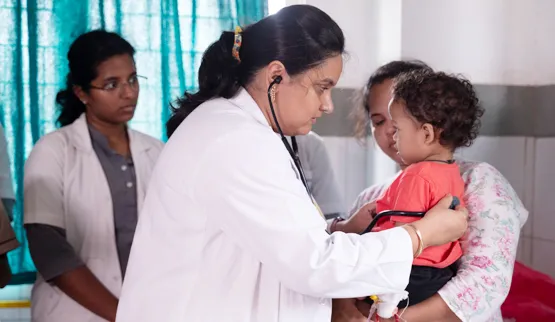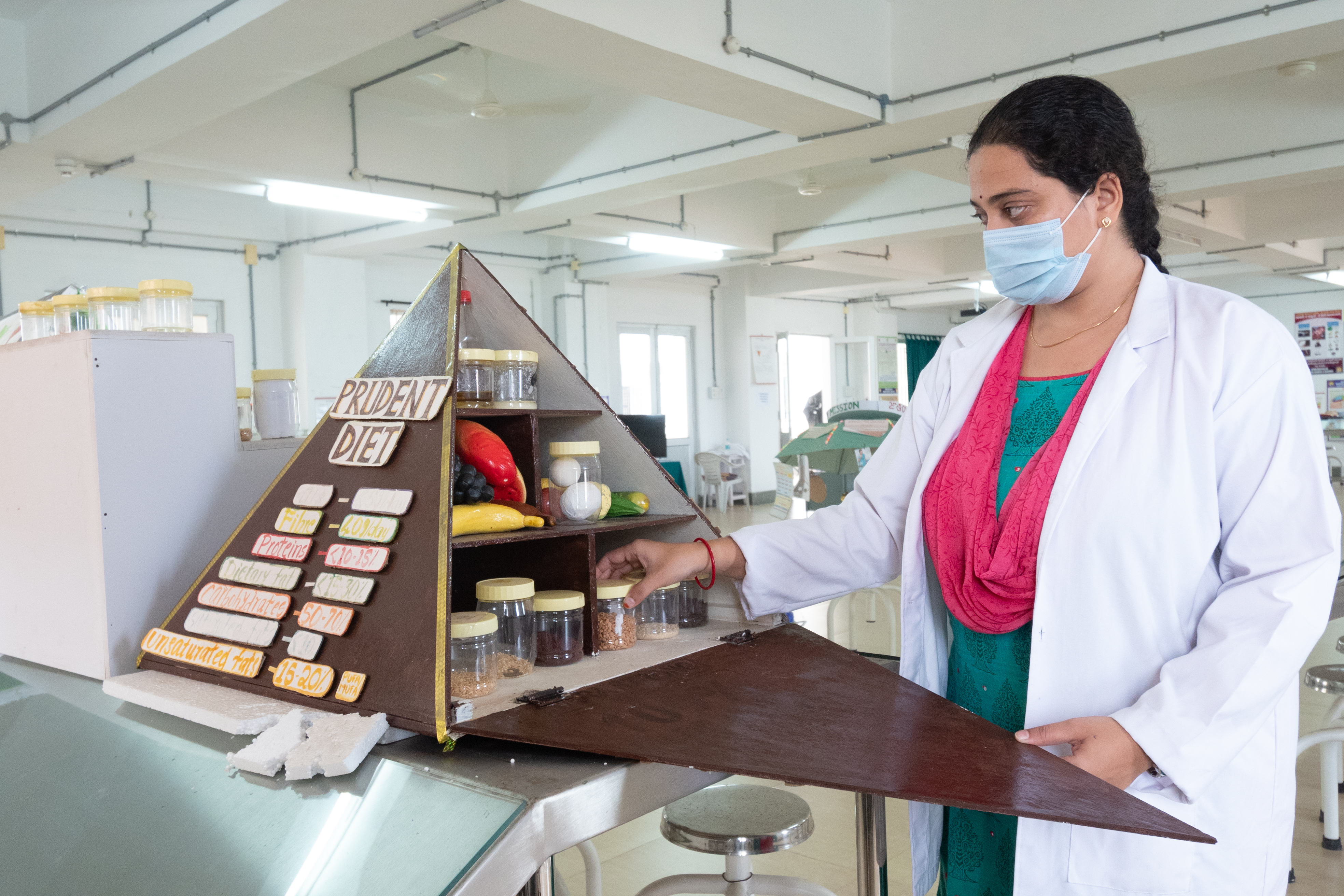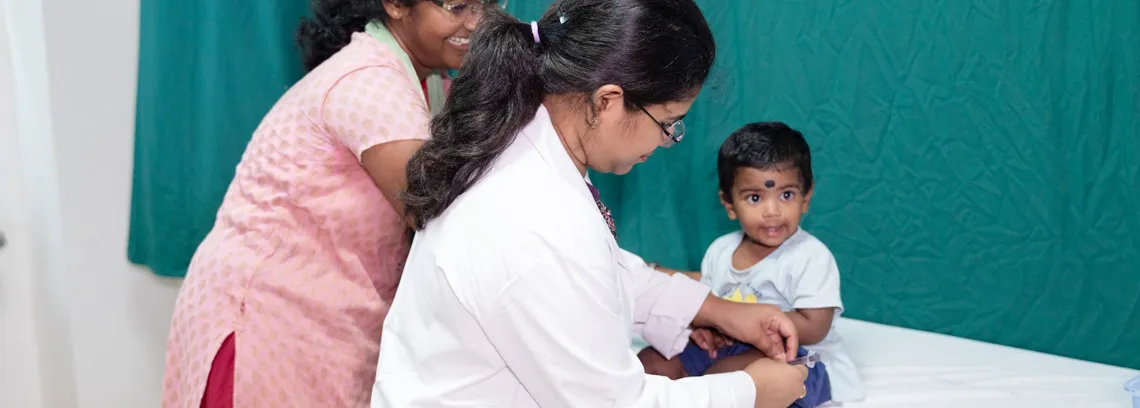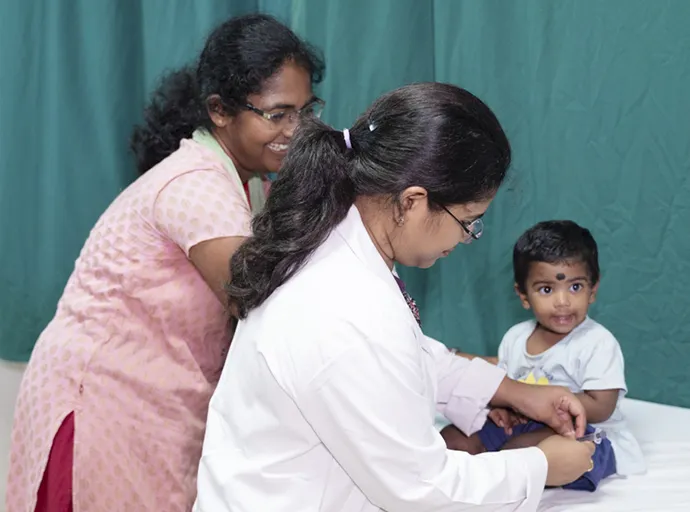Master of Medicine in Paediatrics
A Master of Medicine (MD) in Paediatrics is a postgraduate programme that spans three years, focusing on the medical care of infants, children, and adolescents. To be eligible for this programme, candidates must hold a degree recognised by the Medical Council of India (MCI), such as a Bachelor of Medicine and Bachelor of Surgery (MBBS). This foundational degree is essential for those wishing to become licensed physicians and pursue advanced training in paediatrics.
The field of paediatrics is dedicated to managing the healthcare needs of individuals under 18 years of age, as defined by the criteria set forth by the American Academy of Pediatrics. Paediatricians are responsible for diagnosing and treating various medical conditions affecting younger populations, emphasising preventive care, developmental monitoring, and addressing the unique health challenges that arise during childhood and adolescence.

Eligibility
- MBBS degree from a recognized institution.
- Completion of internship.
- Qualifying NEET-PG examination
Scope of the Programme
The scope of pursuing a Doctor of Medicine (MD) in Paediatrics is broad and impactful, requiring candidates to have a profound commitment to understanding, analysing, and diagnosing the mental and physical health of children. This specialty not only involves treating acute and chronic illnesses in infants, children, and adolescents but also emphasises preventive care, developmental assessments, and health education for families. Paediatricians play a critical role in ensuring that children grow up healthy, making their work essential in various healthcare settings, including hospitals, private clinics, and community health organisations.
Moreover, the growing awareness of children's health issues and the increasing prevalence of paediatric conditions such as obesity, asthma, and mental health disorders have expanded career opportunities in this field. MD graduates in Paediatrics can find roles in research, public health, and academia, contributing to the advancement of child healthcare practices and policies. As the demand for specialised medical professionals continues to rise, those with an MD in Paediatrics are well-positioned to make significant contributions to the well-being of younger populations.
Key Highlights
Application Domain Experience of Faculty
Expertise across diverse pediatric specialties, including:
- Neonatology (NICU)
- Pediatric Intensive Care (PICU)
- Pediatric Cardiology
- Gastroenterology
- Neurology
- Hemato-Oncology
- Nephrology
- Genetics
- Rheumatology
Infrastructure
- State-of-the-art Neonatal Intensive Care Unit (NICU) and Pediatric Intensive Care Unit (PICU)
- Equipped with ventilators, Bubble CPAPs, HFNC machines, and resuscitation rooms
- Dedicated skill lab featuring pediatric mannequins for hands-on training
- Comprehensive out-patient and in-patient care facilities designed for pediatric patients
Areas of Excellence
- NABH-accredited hospital facilities ensuring high standards of care and safety
- Dedicated pediatric skill lab with simulation mannequins for practical learning
- Advanced diagnostic tools and equipment in NICU and PICU settings
- Strong research collaborations with other departments, enhancing academic and clinical outcomes
Practical Exposure
- Extensive clinical training in NICU and PICU, providing real-world experience in managing critical pediatric cases
- Participation in inter-departmental case discussions, board teaching sessions, and expert-led faculty lectures
- Regular seminars, journal clubs, and workshops designed to develop both clinical and research skills for residents
Hospitals & Academic Collaborations
- Basavatarakam Cancer Hospital
- Infosys Limited
- Silver Oaks Educational Society
- INS Kalinga
Institutional Social Responsibility
- Collaborative efforts with local health authorities to support immunization and preventive healthcare programs
- Active engagement in community health initiatives through partnerships and outreach programs
- Commitment to promoting child health awareness through educational activities and public health campaigns
Clinical Facilities
Expertise across diverse pediatric specialties, including:
- Comprehensive care for neonates, including specialized interventions for newborns
- Immunization center operating in collaboration with the District Immunization Office (DIO)
- Partnerships with local institutions, including a Memorandum of Understanding (MOU) with Silver Oaks International School for health services and outreach initiatives
Syllabus
Competency-Based Medical Education (CBME) as directed by the National Medical Commission.
Standard Track offerings of courses
- Physiology
- Microbiology
- Ophthalmology
- Anatomy
- Pathology
- ENT
- Biochemistry
- Pharmacology
- General Medicine
- Yoga and Meditation
- Forensic Medicine & Toxicology
- Community Medicine
- General Surgery & Orthopaedics
- Pediatrics
- Obstetrics & Gynecology
The MD Pediatrics curriculum at GIMSR adheres to the National Medical Council's CBME-based framework, covering core topics such as:
- Growth and Development
- Pediatric Infectious Diseases
- Pediatric Nutrition
- Neonatology
- Pediatric Emergency Medicine
- Chronic Pediatric Diseases
- Research Methodologies
Career Options
Pursuing an MD in Paediatrics opens a range of career opportunities in India, catering to the growing need for specialised healthcare services for children. Graduates can work in various settings, including hospitals, private clinics, and research institutions. Many opt for private practice, allowing greater control over patient care. Opportunities in academia are also available for those interested in teaching future healthcare professionals. Additionally, paediatricians can choose to specialise further in areas such as paediatric cardiology or oncology, thereby enhancing their expertise and career prospects.
The demand for paediatricians is steadily increasing, driven by factors such as rising birth rates and a growing awareness of child health issues. The healthcare sector in India is projected to reach a value of $372 billion by 2022, indicating significant growth and job opportunities across various medical fields, including paediatrics. The competitive admission process for MD Paediatrics programmes further underscores the high interest in this specialisation, with closing ranks often falling below 5,000 in several states.
Graduates from this programme can pursue careers in various sectors such as:
- Paediatrician
- Neonatologist
- Paediatric Surgeon
- Researcher
- Public Health Consultant
Infrastructure That Empowers Medical Excellence















Fee Structure
MD (Paediatrics)
Scholarships
Merit-Based Scholarships
The scholarship from GAT/National/State Entrance Tests applies only in the first year. To continue receiving it in subsequent years, a minimum CGPA of 8.0 must be maintained.
Apart from the above, the following scholarships are also offered to eligible students.
- Employee Children Scholarships: (60%, 40%, and 20%)
- Loyalty Scholarships: (10% for Any alumni returning to do higher studies/Children of Alumni/Real siblings (Not applicable to step siblings or cousins)/Children of retired employees of GITAM/Spouse of GITAM employees).
- Sports Scholarships: (100%, 75%, 50%, 25% and 15%)
Need-Based Scholarships
- To be eligible for the need-based scholarship, the combined income of both parents/guardians of the eligible student/If the student is married, the combined income of the family, i.e., the student's and spouse's income, must be less than 12.00 LPA.
- The candidates admitted through merit scholarship in the slabs of 75%, 60%, 40%, 25%,and 15%, and the parents/guardians combined income is less than the prescribed limits are eligible for the additional need-based scholarship.
| Scholarship % | Upgraded Scholarship % |
|---|---|
| 75% | 100% |
| 60% | 75% |
| 40% | 60% |
| 25% | 40% |
| 15% | 25% |
Scholarships For Accommodation
- In addition, students awarded need-based scholarships after merit scholarships will receive an additional 20% scholarship specifically allocated for hostel fees at GITAM for slabs: 15%, 25%, 40%, and 60%.
- Students awarded 75% & 100% scholarships are also awarded the same percentage in the hostel and food charges.
Scholarship Percentage
100%
Eligibility for 2025
GAT 2025 Score >=141 <=200
GPAT Rank >=1 <=500
AP PGCET 2025 Marks >=110 <=120
TS CPGET 2025 Marks >=95 <=100
Scholarship Percentage
75%
Eligibility for 2025
GAT 2025 Score >=121 <=140
GPAT Rank >=501 <=1000
AP PGCET 2025 Marks >=100 <=109
TS CPGET 2025 Marks >=85 <=94
Scholarship Percentage
60%
Eligibility for 2025
GAT 2025 Score >=111 <=120
GPAT Rank >=1001 <=2000
AP PGCET 2025 Marks >=90 <=99
TS CPGET 2025 Marks >=80 <=84
Scholarship Percentage
40%
Eligibility for 2025
GAT 2025 Score >=101 <=110
GPAT Rank >=2001 <=3000
AP PGCET 2025 Marks >=80 <=89
TS CPGET 2025 Marks >=75 <=79
Scholarship Percentage
25%
Eligibility for 2025
GAT 2025 Score >=91 <=100
GPAT Rank >=3001 <=4000
AP PGCET 2025 Marks >=70 <=79
TS CPGET 2025 Marks >=65 <=74
Scholarship Percentage
15%
Eligibility for 2025
GAT 2025 Score >=81 <=90
GPAT Rank >=4001 <=6000
AP PGCET 2025 Marks >=55 <=69
TS CPGET 2025 Marks >=50 <=64








